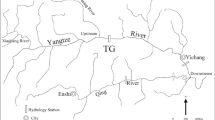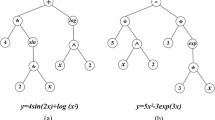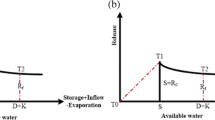Abstract
The short-term hydropower generation scheduling (STHGS) is a complicated problem in the utilization of hydropower and water resources. An improved binary-coded whale optimization algorithm (IBWOA) is proposed in this paper to solve the complex nonlinear problem. The STHGS problem is divided into unit combination (UC) subproblem and economic load distribution (ELD) subproblem. For the UC subproblem, we use the sigmoid function (SF) to generate a binary array representing the start/stop state of the unit. The whale algorithm's search mechanism is optimized, and the inertia weight and perturbation variation strategy are introduced to improve the algorithm's optimization ability. Each generation solution is optimized by repairing the minimum uptime/downtime constraint and the spinning reserve capacity constraint. For ELD subproblem, the optimal stable load distribution table (OSLDT) is used to distribute the load quickly. The Mutation mechanism and the Locally balanced dynamic search mechanism compensate for the non-convex problems caused by start-stop constraints and stable optimal table methods. Finally, the proposal is applied to solve the STHGS of the Three Gorges Hydropower Station. When the water head is 75 m,88 m, and 107 m, the minimum water consumption calculated by the IBWOA algorithm is 1,058,323,464 m3, 892,524,696 m3, and 745,272,216 m3, respectively. Compared with the traditional whale optimization algorithm, the water consumption of the IBOWA algorithm corresponding to 75 m, 88 m, and 107 m water heads is reduced by 0.76%, 0.26%, and 0.05%, respectively. The comparison between the IBWOA algorithm and other heuristic algorithms shows that the IBWOA has good feasibility and high optimization accuracy.




Similar content being viewed by others
References
Amani A, Alizadeh H (2021) Solving Hydropower Unit Commitment Problem Using a Novel Sequential Mixed Integer Linear Programming Approach. Water Resour Manag 35:1711–1729
Bukhari SBA, Ahmad A, Raza SA, Siddique MN (2016) A ring crossover genetic algorithm for the unit commitment problem. Turk J Electr Eng Comput Sci 24(5):3862–3876
Cheng CP, Liu CW, Liu CC (2000) Unit commitment by Lagrangian relaxation and genetic algorithms. IEEE Trans Power Syst 15:707–714
Fakhar MS, Kashif SAR, Saqib MA, Hassan TU (2015) Non cascaded short-term hydro-thermal scheduling using fully-informed particle swarm optimization. Int J Electr Power Energy Syst 73:983–990
Feng ZK, Niu WJ, Cheng CT, Wu XY (2018) Peak operation of hydropower system with parallel technique and progressive optimality algorithm. Int J Electr Power Energy Syst 94:267–275
Finardi EC, Scuzziato MR (2013) Hydro unit commitment and loading problem for day-ahead operation planning problem. Int J Electr Power Energy Syst 44(1):7–16
Hu F, Zhang DH, Yang XC (2012) Optimal load distribution and commitment of automatic generation control units in hydropower station based on ant colony algorithm. Water Resources and Power 30(12):123–126
Hu H, Yang K, Liu L et al (2019) Short-Term Hydropower Generation Scheduling Using an Improved Cloud Adaptive Quantum-Inspired Binary Social Spider Optimization Algorithm. Water Resour Manag 33:2357–2379
Ivanov O, Neagu BC, Grigoras G et al (2019) Optimal capacitor bank allocation in electricity distribution networks using metaheuristic algorithms. Energies 12
Jabr RA, Coonick AH, Cory BJ (2000) Homogeneous linear programming algorithm for the security constrained economic dispatch problem. IEEE Trans Power Syst 15(3):930–936
Jukna S (2014) Limitations of incremental dynamic programming. Algorithmica 69(2):461–492
Li Z, Jin T, Zhao S, Liu J (2018) Power system day-ahead unit commitment based on chance-constrained dependent chance goal programming. Energies 11(7):1718
Lu B, Li K, Zhang H, Wang W, Gu H (2013) Study on the optimal hydropower generation of Zhelin reservoir. J Hydro-Environ Res 7(4):270–278
Mirjalili S, Lewis A (2016) The whale optimization algorithm. Adv Eng Softw 95:51–67
Mohanta RK, Chelliah TR, Allamsetty S, Akula A, Ghosh R (2017) Sources of vibration and their treatment in hydro power stations-a review. Eng Sci Tech, an International Journal 20(2):637–648
Nilsson O, Sjelvgren D (1997) Hydro unit start-up costs and their impact on the short term scheduling strategies of Swedish power producers. IEEE Trans Power Syst 12:38–44
Peng L, Zhou J, Wang C, Qiao Q, Li M (2015) Short-term hydro generation scheduling of xiluodu and xiangjiaba cascade hydropower stations using improved binary-real coded bee colony optimization algorithm. Energy Convers Manag 91:19–31
Pérez-Díaz JI, Wilhelmi JR, Arévalo LA (2010) Optimal short-term operation schedule of a hydropower plant in a competitive electricity market. Energy Convers Manag 51:2955–2966
Pericaro GA, Karas EW, Gonzaga CC et al (2020) Optimal non-anticipative scenarios for nonlinear hydro-thermal power systems. Appl Math Comput 387:124820
Shang Y, Fan Q, Shang L, Sun Z, Xiao G (2019) Modified genetic algorithm with simulated annealing applied to optimal load dispatch of the Three Gorges Hydropower Plant in China. Hydrol Sci J 64(9):1129–1139
Shi L, Hao J, Zhou J et al (2004) Short-term generation scheduling with reliability constraint using ant colony optimization algorithm. In: Fifth World Congress on Intelligent Control and Automation, IEEE, pp 5102–5106
Su LW, Yang K, Hu H, Yang Z (2019) Long-term hydropower generation scheduling of large-scale cascade reservoirs using chaotic adaptive multi-objective bat algorithm. Water 11:2373
Tian T, Zhao W, Zhen W et al (2020) Application of improved whale optimization algorithm in parameter identification of hydraulic turbine at no-load. Arab J Sci Eng 45:9913–9924
Vaisakh K, Srinivas L (2011) Evolving ant colony optimization based unit commitment. Appl Soft Comput 11:2863–2870
Wood AJ, Wollenberg B (1996) Power generation operation and control - 2nd edition. IEEE Power Energy Mag 12(4):90–93
Wu F (2015) Economic dispatch for wind-thermal hybrid power systems based on particle swarm optimization. Dissertation, North China Electric Power University (in Chinese)
Yang Z, Yang K, Su L et al (2020) The Short-Term Economical Operation Problem for Hydropower Station Using Chaotic Normal Cloud Model Based Discrete Shuffled Frog Leaping Algorithm. Water Resour Manag 34:905–927
Yi YJ, Zhou Y, Song J, Zhang S, Cai Y, Yang W, Yang Z (2019) The effects of cascade dam construction and operation on riparian vegetation. Adv Water Resour 131:103206
Zeng X, Hu T, Xi C et al (2019) Improved dynamic programming for parallel reservoir system operation optimization. Adv Water Resour 131:103373
Zhang J, Wang JS (2020) Improved whale optimization algorithm based on nonlinear adaptive weight and golden sine operator. IEEE Access 8:77013–77048
Zhao T, Zhao J, Yang D (2012) Improved dynamic programming for hydropower reservoir operation. J Water Resour Plan Manag 140(3):365–374
Funding
The achievement is supported by the National Key Basic Research Program of China (973 Program) (2012CB417006) and the National Science Support Plan Project of China (2009BAC56B03).
Author information
Authors and Affiliations
Contributions
Conceptualization and material preparation: Kan Yang; Methodology, data collection, modeling process and analysis: Kun Yang.
Corresponding author
Additional information
Publisher's Note
Springer Nature remains neutral with regard to jurisdictional claims in published maps and institutional affiliations.
Rights and permissions
About this article
Cite this article
Yang, K., Yang, K. Short-Term Hydro Generation Scheduling of the Three Gorges Hydropower Station Using Improver Binary-coded Whale Optimization Algorithm. Water Resour Manage 35, 3771–3790 (2021). https://doi.org/10.1007/s11269-021-02917-0
Received:
Accepted:
Published:
Issue Date:
DOI: https://doi.org/10.1007/s11269-021-02917-0




